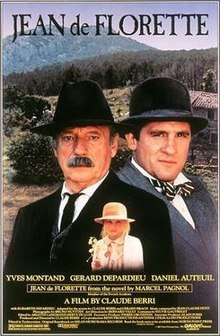| Jean de Florette | |
|---|---|
 Theatrical release poster | |
| Directed by | Claude Berri |
| Written by | Claude Berri Gérard Brach Marcel Pagnol |
| Produced by | Pierre Grunstein Alain Poiré |
| Starring | Yves Montand Gérard Depardieu Daniel Auteuil |
| Cinematography | Bruno Nuytten |
| Edited by | Noëlle Boisson Sophie Coussein Hervé de Luze Jeanne Kef Arlette Langmann Corinne Lazare Catherine Serris |
| Music by | Jean-Claude Petit Giuseppe Verdi |
| Distributed by | Orion Pictures (USA) |
Release date |
|
Running time | 120 minutes |
| Countries | France Italy Switzerland[1] |
| Language | French |
| Budget | 120 million Franc ($17 million)[2] |
| Box office | $87 million |
Jean de Florette (French pronunciation: [ʒɑ̃ də flɔʁɛt]) is a 1986 period drama film directed by Claude Berri. It was followed by Manon des sources, released the same year. Both are the adaptation of Marcel Pagnol’s 1963 two-part novel The Water of the Hills, with the second part also being adapted from Pagnol's original 1952 film Manon of The Spring. Berri's version was the first attempt at adapting the whole saga, including the first part, Jean de Florette, which was originally written as a prequel to the novelization of Manon of The Spring.
The story takes place in rural Provence in the 1920s, where two local farmers plot to trick a newcomer out of his newly inherited property. The film starred three of France's most prominent actors – Gérard Depardieu, Daniel Auteuil, who won a BAFTA and a César award for his performance, and Yves Montand in one of his last roles.
The film was shot back to back with Manon des sources, over a period of seven months. At the time the most expensive French film ever made, it was a great commercial and critical success, both domestically and internationally, and was nominated for eight César awards, and 10 BAFTAs. The success of the two films helped promote Provence as a tourist destination.
- ^ Erickson, Hal. "Jean de Florette: Overview – Allmovie". Allmovie. Retrieved 15 February 2009.
- ^ Cite error: The named reference
Varietywas invoked but never defined (see the help page).